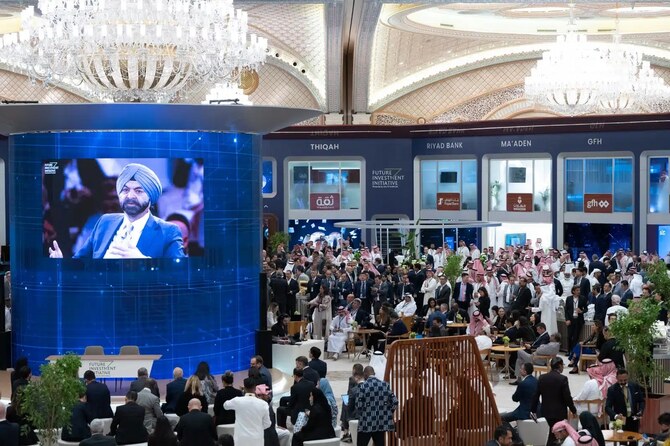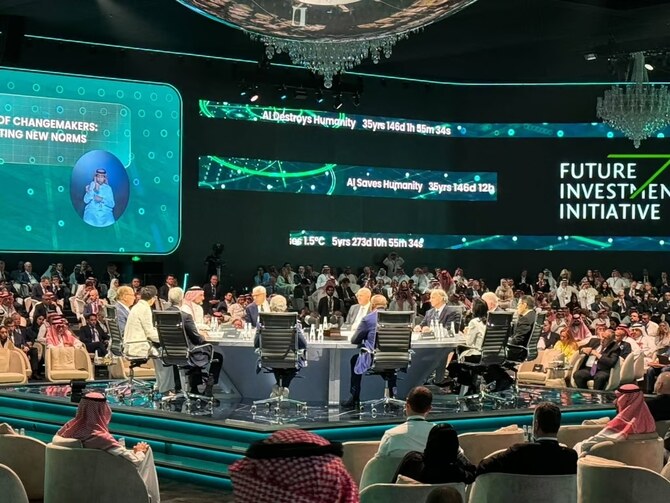RIYADH: World leaders and industry experts are set to gather in Saudi Arabia’s capital city for the eighth edition of the Future Investment Initiative to discuss opportunities and challenges across the global financial landscape.
Held under the theme “Infinite Horizons: Investing Today, Shaping Tomorrow,” from Oct. 29 to 31, this year’s FII is expected to ignite discussions on how investment can serve as a catalyst for a prosperous and sustainable future.
In the lead-up to the event, FII Insitute CEO Richard Attias said deals worth $28 billion are expected to be announced during the gathering.
He also said that 7,100 participants worldwide are registered for the upcoming event. “It is 1,000 more than last year,” he told a press conference on Oct. 15.
Since its launch in 2017, the FII Institute has been organizing annual events in Riyadh, and over the years the program has emerged as one of the flagship conferences in the financial sector.
Apart from the industry experts, this year’s event will also bring leaders and decision-makers in artificial intelligence, sustainability, energy, geoeconomics and space.
FASTFACTS
- The conference will feature over 500 speakers and facilitate over 200 sessions, plenary discussions, breakouts and conclaves addressing economic stability, geopolitical tensions, and equitable development. - The event will focus on strategies leaders need to tackle new challenges in an infinitely connected world.
The conference will feature over 500 speakers and facilitate over 200 sessions, plenary discussions, breakouts and conclaves addressing economic stability, geopolitical tensions, and equitable development.
A press release marking the gathering noted that with the 79th UN General Assembly concluding and the US presidential elections immediately following FII8, the geoeconomic conversations and insights generated at the conference “will serve as a vital addition to the global dialogue, equipping leaders with forward-thinking strategies to navigate the upcoming global landscape.”
FII: The brainchild of the Public Investment Fund
Saudi Arabia’s sovereign wealth fund founded the Future Investment Initiative Institute as a part of the Kingdom’s Vision 2030, which aims to position the country as a global hub for business growth.
As Saudi Arabia is on a path of transformation, the events organized by the institute have proved to be a strong component of the Kingdom’s regional and global growth in finance and investment.
According to FII, this year’s conference will challenge attendees to think beyond conventional limits and explore investment opportunities that can bridge current challenges with future possibilities.
“FII8 pioneers a new kind of mindset — where leaders and game changers break free of past limitations, fueling innovation that leads to boundless human potential and economic growth,” said the organization’s website.
It added: “The world’s visionaries will explore how nonlinear thinking can deploy capital to address the planet’s most critical issues — from infrastructure gaps to environmental threats — ultimately achieving the optimal point between planetary consumption and regeneration, and positively impacting humanity.”
FII8: Speakers list
The first day of the event will focus on strategies leaders need to tackle new challenges in an infinitely connected world.
The opening ceremony will begin at 9:00 a.m. Saudi time, and it will be followed by welcome remarks by Attias.
Yasir Al-Rumayyan, governor of the Public Investment Fund and the chairman of FII Institute, will also deliver his speech on the first day of the event.
Saudi Arabia’s Minister of Investment Khalid Al-Falih will use his address to discuss the role of policymakers in establishing a robust regulatory framework, navigating global economic shifts to instill optimism and create a path toward growth.
7,100 participants from around the world are registered for the event.
Richard Attias, FII Insitute CEO
Turkiye’s Minister of Treasury and Finance Mehmet Simsek, Chief Information Officer mentor for asset management firm Board Bridgewater Associates Ray Dalio, and Makhtar Diop, managing director of International Finance Corp., will also speak on panels on the first day.
On the first day, in a panel titled “First Board of Changemakers: Geoeconomics,” top industry leaders including Laurence Fink, CEO of Blackrock, Ruth Porat, president and Chief Information Officer of Alphabet and Google, Stephane Bancel, CEO of Moderna, as well as Stephen Schwarzman, chairman and CEO of the Blackstone Group, will share their thoughts on strategies that could be implemented to combat environmental challenges and economic inequalities.
Muhammed Al-Jasser, chairman of the Islamic Development Bank will also speak on a panel named “Second Board of Changemakers: Banking and Investment,” where he will discuss persisting economic challenges the world is facing and the ways to tackle the problems.
Mohammad Maziad Al-Tuwaijri, vice chairman of Saudi Arabia’s National Development Fund, along with Bernard Mensah, president of International for Bank of America will take part in a panel on global financial stability.
The first day will also feature discussion on the vitality of accelerating the energy transition journey.
This session will feature industry leaders including Amin Nasser, president and CEO of Saudi Aramco, Marco Arcelli, CEO of ACWA Power, Catherine MacGregor, CEO of Engie, and Patrice Motsepe, founder and executive chairman of African Rainbow Minerals.
Other notable speakers who will be attending panels on the first day include Shou Chew, CEO of TikTok, Brian Hongdi Gu, co-president of Xpeng, Masayoshi Son, chairman and CEO of SoftBank Group Corp., as well as Mansoor Ebrahim Al-Mahmoud, CEO of Qatar Investment Authority, and Sarah Al-Suhaimi, chairperson of board of directors of Saudi Tadawul Group.
The second day of the event will be based on the theme “New Algorithms” where discussions will take place around building future-ready talent to cultivate social resilience, with a focus on how leaders can harness the power of emerging technology for positive impact.
Some of the noted speakers on the second day include Mohamed Jameel Al-Ramahi, CEO of Masdar, Marcelo Claure, founder and CEO of Claure Group, Julie Sweet, chairman and CEO of Accenture, as well as Eric Schmidt, founder and CEO of Schmidt Family Foundation, and Gautam Sashittal, CEO of King Abdullah Financial District.
Arif Amiri, CEO of Dubai International Financial Center Authority, Olayan Alwetaid, group CEO of STC, and Ossama Rabiee, chairman and managing director of Suez Canal Authority, will also attend panel discussions on the second day of the event.
FII8’s third day is titled “Investment Day” where discussions will revolve around practical aspects of investing, offering hands-on guidance and tactical knowledge.
Noted personalities who will speak on this topic include Tony Douglas, CEO of Riyad Air, Rishi Kapoor, vice chairman and Chief Information Officer of Investcorp, Zoe Cruz, founder and CEO of Menai Financial Group, and Benjamin Horowitz, co-founder and partner of Andreessen Horowitz.
The third day will also witness leaders from the hospitality sector attending a panel where they will discuss the latest trends in tourism and its impacts on the real estate sector.
Speakers who will be attending this panel include Sebastien Bazin, chairman and CEO of Accor, Elie Maalouf, CEO of IHG Hotels & Resorts, Ferit Sahenk, chairman and CEO of Dogus Group, as well as Christopher J. Nassetta, president and CEO of Hilton.






























